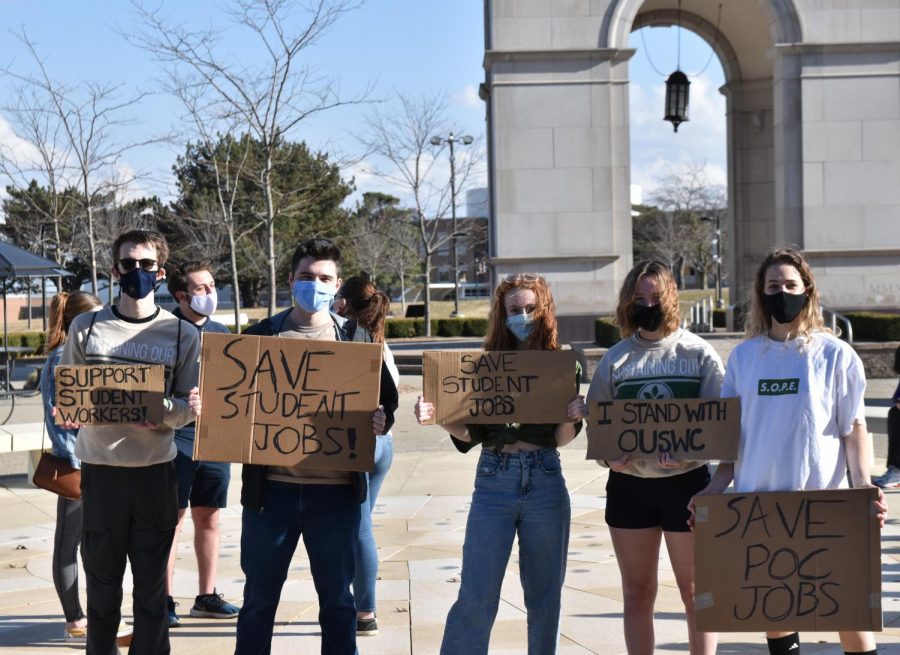Housing employment protest turns to celebration
Students hold signs they prepared for the protest at Elliot Tower on Thursday, March 11. The protest turned into a celebration after some of their concerns were addressed the morning of the protest.
Students planned to protest cut housing positions — Sustaining Our Planet Earth, nightwatch and the bear bus — but University Housing reinstated several positions the morning of the march, Thursday, March 11.
Igniting the employment protest
Oakland United Student Workers Coalition began drawing attention to eliminated programs, positions and benefits a week ago. The group also gained recognition from Black Lives Matter OU and OU Student Congress running mates Jordan Tolbert and Brennan Smith.
Students discussed their concerns at the OUSC debates and in a Resident Life Association meeting both on Monday, March 9. To encourage change, a petition was also introduced, which had almost 700 signatures before the scheduled protest.
Jeremy Johnson, OUSC director of civic affairs and Oak View Hall residential assistant, began the discussion in the RLA meeting by comparing the level of funding and necessity of SOPE.
“SOPE has a very small budget compared to the larger budget of housing as a whole,” Johnson said. “For the output that they give housing — having multiple programs a month that are also bringing in hundreds of residents — from where I’m standing… cutting them doesn’t make sense.”
All five SOPE positions were cut for the 2021-2022 school year. As a replacement housing introduced an RLA sustainability position though.
“We are down in numbers — both individuals on campus as well as dollars within the budget,” Housing Director Jim Zentmeyer said. “I hate to put it in these terms — but it is the reality.”
The elimination of nightwatch was also introduced, and Zentmeyer referenced the same budgetary issues.
With unresolved concerns, students continued to plan on a protest from TreeRunner Adventure Park to Sunset Terrace — the home of OU President Ora Hirsch Pescovitz — at 3 p.m. on Thursday, March 11. Protesters intended to stay until sunset as well.
“We were going to march from TreeRunner’s parking lot to Sunset Terrance to make our voices heard because our voices hadn’t been heard, until this point,” Johnson said.
However, fifteen hours before the protest OUSWC posted on instagram that Zentmeyer still thought reinstating SOPE and nightwatch was “unlikely,” and protesters’ jobs could be in danger.
“… Given the fact we haven’t been guaranteed any job returns, the protest will be happening and we hope to get everyone’s attendance,” the OUSWC instagram post read. “If you work for OU Housing, the Director of Housing [Zentmeyer] could not guarantee that you will not be terminated if you attend the protest…”
Transition to celebration
Thursday morning students were notified SOPE and nightwatch (45 jobs) would be saved by directing funds from the CARES act into those positions’ wages. Roughly three hours before the protest, OUSWC announced a celebration was in store, instead.
Students were instructed to gather at Elliott Tower for snacks and drinks.
Before the celebration began, Jesse Hurse, associate dean of students and deputy title IX coordinator, stopped and greeted all the students. Zentmeyer also made an appearance, but left quickly for a COVID-19 vaccine appointment.
“This solidarity of student employment has been outstanding,” Hurse said. “It’s something I’ve truly missed. It’s a glimmer of hope for what we can look forward to in the fall semester.”
Johnson welcomed around 20 students to the celebration, and then Sam Torres, Oakview Hall RA, explained the trajectory of the past week.
“This is relatively quick, and that’s a testament to how incredible you guys are for making your voices heard so quickly,” Torres said.
Torres also emphasized the “longevity” of their movement, ensuring their work wasn’t done yet. Continued communication will be key going forward, according to Torres.
Next, OUSC presidential candidate Tolbert took the megaphone. She thanked students for their involvement and creating an “amazing turnaround” in less than 12 hours, but she also reminded attendees of the work still to be done.
“There’s still so much more to be done,” she said. “We will [n]ever become housing. We will never stand against student workers, and we will work to get everything done in our petition.”
Attendees insisted she speak about her campaign as well. Tolbert initially hesitated but reminded everyone of her platform — focusing on diversity and inclusivity — and that voting does begin on Friday, March 12.
“It’s not about my campaign — it’s about all of you,” she said.
Andrew Romano and Emily Sines spoke on behalf of SOPE. Both discussed SOPE’s sustainability efforts on campus.
More than 500 people have attended SOPE’s events with a budget of under $2,000, and RLA had under 200 students attend events with a budget of over $20,000, according to Romano.
“What are the university’s priorities?” Romano asked.
OUSWC’s next mission
While this was a celebration, there is still more OUSWC is fighting to bring back.
They are pushing to increase desk attendants’ hours, offer academic peer mentors full benefits and bring back the Bear Bus.
Desk attendants’ maximum hours were reduced to 10 from 25 for the 2021-2022 school year. Attendants handle some mailing, issuing toilet paper and guiding anyone entering their assigned building.
Previously, APMs received free housing, which was revoked. APMs tutor and mentor students and offer programs.
Romano and Tolbert agreed that bringing back the Bear Bus would be their next mission. Students with physical disabilities and international students without a U.S. license relied on the bear bus, according to Romano.
Each of these changes were made due to budget restrictions, but Romano doesn’t agree with that logic and plans to continue this movement.
“I don’t think we should ever put a price tag on making OU accessible,” he said.










